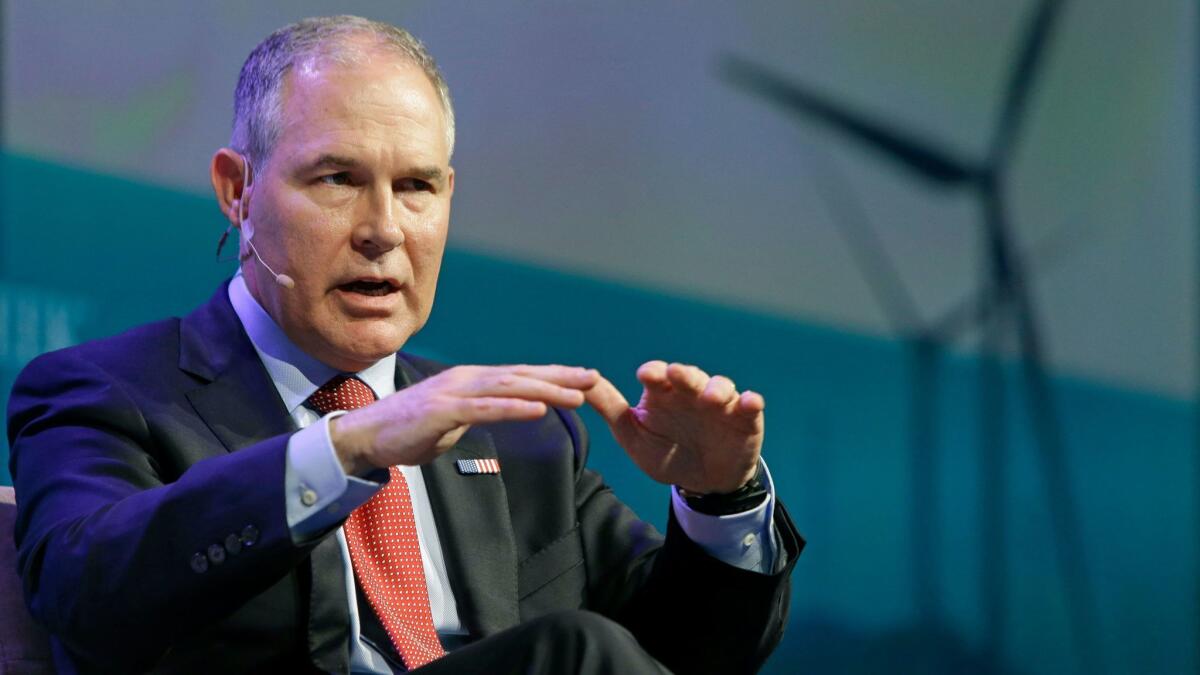Editorial: Like the quality of the air you breathe? You better start lobbying to save it

The early word on President Trump’s budget is that he will recommend slashing the Environmental Protection Agency by $2 billion, or 25%, including a 19% cut in staffing, or about 3,000 people who do the actual work of protecting the environment. In a normal administration, a department head facing such drastic cuts would fight tooth and nail to restore as much funding as he could. But as has been evident from the get-go, this is not a normal administration, and EPA director Scott Pruitt is not a normal agency head. He looked at Trump’s budget recommendation for his agency and said, in effect, “Looks good, boss,” with a few small caveats.
Fortunately, an administration’s proposed budget doesn’t have all that much influence on what gets funded at what level. Those decisions get hammered out in negotiations with Congress, for better or worse. But a president’s proposed budget makes for good tea-leaf reading for figuring out an administration’s priorities. And protecting the environment, even as the world careens toward catastrophic climate change, matters not a whit to the White House.
It should to the public, though, including people who voted for Trump in hopes of changing both the government, and the culture, in Washington. It’s hard to imagine, for instance, that voters in Ohio, Michigan, Indiana and Wisconsin (which Trump carried in 2016) anticipated their candidate would all but kill the Great Lakes Restoration Initiative by slashing the $300 million spent fighting algae blooms, invasive species and other threats to water quality — all threats to the tourism industry — to just $10 million.
There is no defensible reason to reduce or undercut these federal protections
Did voters seeking to drain the swamp also intend to kill $50 million in grants under the Diesel Emissions Reduction Act, a program that has helped Alabama, Georgia, Kentucky and other red states across the Southeast and Midwest improve air quality? Or slash state grants for controlling water pollution by $31 million, or 30%? Or eliminate $9.5 million in state grants to test beach water quality?
The last time you went shopping for an appliance you probably noted the little blue Energy Star sticker that rates the equipment for its environmental impact and power costs. Since its inception in 1992, that program has helped cut consumer utility bills by $362 billion, and eliminated 19,923 billion tons of greenhouse gas emissions. What’s more, the program is voluntary — just the kind of thing Republicans usually embrace — and costs the government only about $57 million a year to administer, a tiny fraction of the $3.9-trillion federal budget. That would be eliminated if Trump gets his way, under the argument that the private sector should perform that function. Yet Energy Star has been so successful because, as a government program, it is viewed by the public as impartial. Letting industry vouch for itself would undercut public confidence in the ratings.
These are all relatively small-dollar programs that have significant impacts on the nation’s environmental health, and with the exception of the diesel-emissions grants, they are not directly connected with climate change. But the cuts are part of a broader strategy to undermine the agency and its crucial mission to protect the environment — one which will also make fighting climate change much harder for the rest of the world as well. Trump and Pruitt both cling to the absurd idea that human activity (burning fossil fuel for energy) is not a primary driver of global warming, and so also have their sights sets on dismantling government efforts to control emissions from power plants, and rolling back demands for higher fuel efficiency — and thus lower emissions — from motor vehicles.
This is foolishness. Federal emissions regulations have, over the last quarter-century, saved hundreds of thousands of lives and improved the health of millions more. According to one EPA analysis, all 41 regions reporting unhealthy levels of carbon monoxide in 1991 now meet the “health-based national air quality standard.” Smog that used to smother Los Angeles has been sharply reduced. More broadly, cutting air pollution has also reduced damage to plants and soil nutrients, reduced toxins in the food chain, rolled back damage to lakes and streams (think acid rain), and other direct benefits.
There is no defensible reason to reduce or undercut these federal protections. And those who demand environmental protections need to pressure Congress to make certain that Trump and Pruitt’s smoggier, smellier and more toxic vision of America’s future doesn’t get approved.
Follow the Opinion section on Twitter @latimesopinion or Facebook.
More to Read
A cure for the common opinion
Get thought-provoking perspectives with our weekly newsletter.
You may occasionally receive promotional content from the Los Angeles Times.










